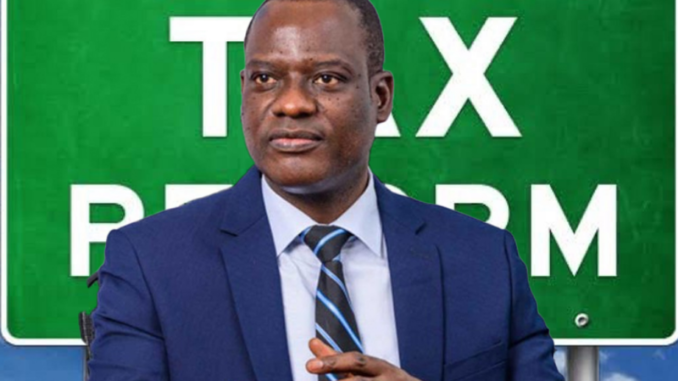
Chairman of the Presidential Committee on Fiscal Policy and Tax Reforms, Taiwo Oyedele has stated that the Nigeria Tax Reform Bill is expected to be enacted into law by the end of the first quarter of 2025....CLICK HERE TO READ THE FULL ARTICLE➤
Speaking virtually on Thursday at the Lagos Chamber of Commerce and Industry’s 2025 Economic Review and Outlook Conference, Oyedele predicted an increase in national debates on the Tax Bill as its implementation approaches in 2025.
He acknowledged the lengthy deliberations on the proposed reforms, saying, “Tax reforms have turned out to be quite interesting for almost the better part of 2024. It is normal to have debates on tax matters because it affects people directly. We are engaging with our key stakeholders and believe we are making progress; we do expect that the Tax Bill should be enacted into law before the end of Q1 2025.
“That would give us about three months, 90 days notice, to commence the implementation of the Reform Bills by the second half of the year, by early July,” he said.
Oyedele also expressed enthusiasm for the provisions of the Tax Reform Bills, noting that some of them “keep me excited every time” as he anticipates their potential benefits for the country.
“For the first time in my adult life, he said, “We have this comprehensive reform where we’re focusing on businesses, how to make them more competitive, how to reduce their costs, how to bring down their tax rates, and how to ensure that small businesses can thrive without the excess burden that they have been dealing with for only God knows how long.
“How do you protect the most vulnerable people, low-income earners? How do you ensure that within governments there’s some sanity as to how revenues are collected and how taxes are introduced?”
Commenting on the aim of the tax reforms, he noted that they were designed to address various issues, including public sector abuse. He remarked, “We know of government agencies that got their establishment laws amended and introduced taxes to fund agencies that the private sector has to provide.
“It was almost like nobody was thinking that these private sectors have limited resources. They do not have endless pockets to fund everybody and every agency. So, the fact that we’re having this national conversation, which is creating that awareness in itself, is a win, and it can only get better.”
He cast a positive outlook on Nigeria’s fiscal health in 2025, adding, “Overall, I am positive about 2025 and what it holds for our country, for businesses, for individuals, and for families, and by complementing the other initiatives of governments with sound fiscal policies, I think it can only get better.
“We expect that inflation will start to moderate because the factors that push up costs and prices in 2024 are no longer there in 2025. It’s almost like a reset.”
Oyedele also proposed that the country establish a Producers’ Cost Index (PCI) to obtain more accurate data for tackling inflation.
He emphasized the importance of implementing a PCI while discussing the rebasing of the Consumer Price Index, a tool used by the National Bureau of Statistics to measure inflation.
“One of the biggest issues we’ve had to deal with in the past couple of years has been high inflation,” Oyedele asserted. “Some of us did not entirely believe that monetary policy could solve the problem because some of the issues were structural and not entirely due to excess money supply or excess demand. Otherwise, why is it that manufacturers have over N1tn of unsold inventory?
“It means that capacity is down, which means they are producing less, and then there is more unsold inventory. Once we rebase the CPI basket, it will give us a more reliable indication of where things are going.”
The tax reform chairman explained that households, businesses, and individuals experience inflation rates tailored to their specific economic situations, distinct from national figures: “We have to get to that point where our most vulnerable population will not have to bear the brunt of rising prices significantly, which is sometimes compounded by (different) taxes and levies on the most basic consumptions.”
He added, “That is why in our Tax Reform Bills, we have provisions to zero-rate and remove the value-added tax on basic consumptions, including food, health, education, and a few other items.”
Furthermore, he emphasized the importance of a Producers’ Cost Index (PCI) alongside the computation of the Consumer Price Index (CPI), highlighting their necessity for tracking the growth trajectory of businesses.
“What are those factors pushing up the cost of producers? If you have foreign exchange pass-through, energy prices going up, and transportation challenges, infrastructure is not the way it should be, and interest rates are going at 35 to 40 per cent to finance working capital; once you are done, you have to absorb whatever it is that you are producing, and that will then impact the amount at which you sell.
“Maybe if we have a producers cost index survey, it will help us with more reliable data to determine how we tackle issues around inflation and to what extent monetary policy interventions will be able to help in that regard,” he concluded. ...CLICK HERE TO READ THE FULL ARTICLE➤
Be the first to comment